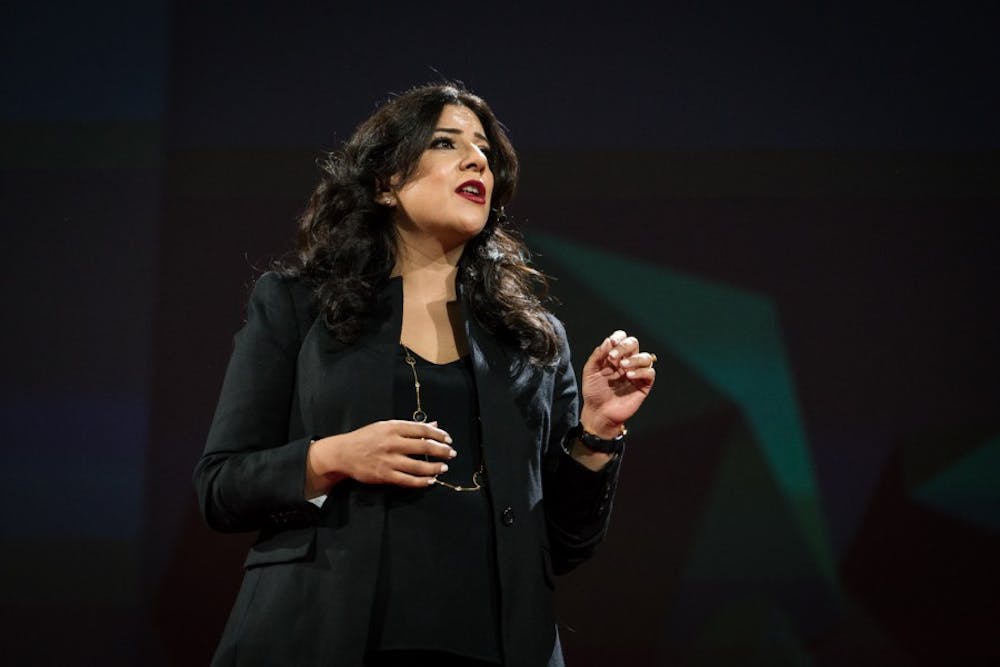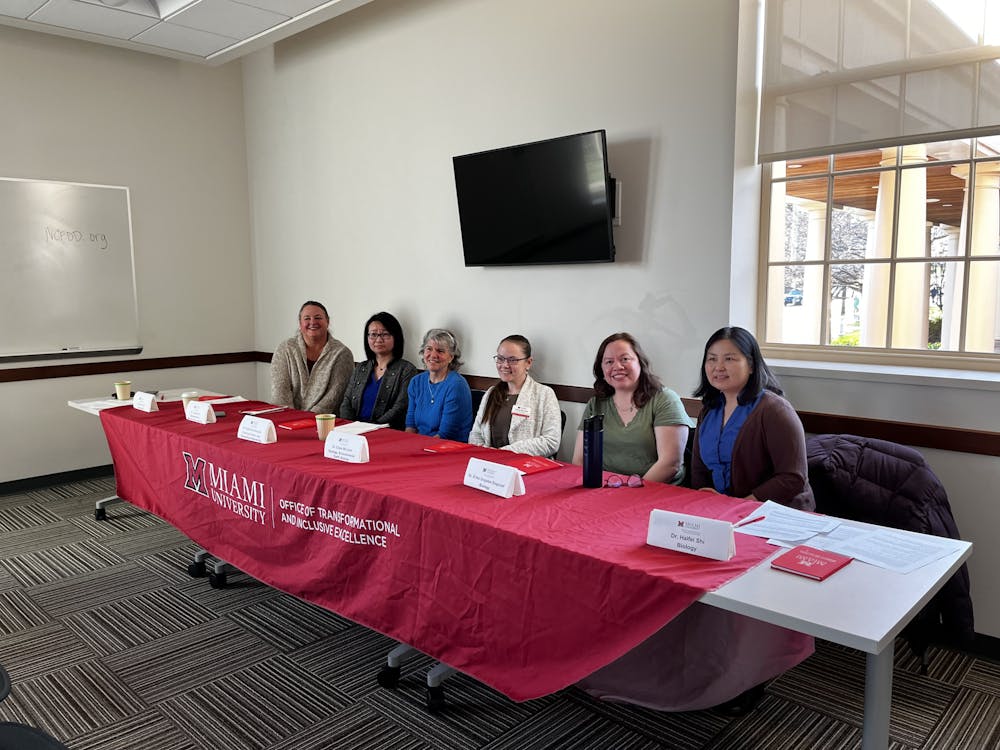Reshma Saujani, founder and CEO of the national nonprofit Girls Who Code, visited Oxford on Monday to deliver a keynote address, "Girls Who Code: Paving a STEM Path Forward" as part of Miami's Lecture Series Monday night. Saujani, a former attorney, became passionate about closing the gender gap in technology in 2010, during her campaign as the first Indian-American woman to run for Congress. Before Saujani addressed a packed crowd at Hall Auditorium, The Miami Student sat down with her to discuss her undergraduate experience.
Code: Paving a STEM Path Forward" as part of Miami's Lecture Series Monday night. Saujani, a former attorney, became passionate about closing the gender gap in technology in 2010, during her campaign as the first Indian-American woman to run for Congress. Before Saujani addressed a packed crowd at Hall Auditorium, The Miami Student sat down with her to discuss her undergraduate experience.
TMS: Given my questionable coding ability, I was a bit nervous about conducting this interview. But when you decided to found a nonprofit teaching young girls to code, you actually didn't know how to code.
Reshma Saujani: No. And I've learned since I've started Girls Who Code. But when I started, no, I didn't. I was definitely one of those girls that was terrified of math and science growing up.
TMS: So you've learned to code since?
Saujani: Well, it's hard to go around talking about it if you don't know how. When I first started learning -- it's frustrating, right? It's hard to learn a new skill. I think it's hard to get over that voice in your head that tells you you can't do this. I think what I love about coding is it's all about problem solving, like how to get from point A to point B.
TMS: Problem-solving isn't a foreign concept for you -- you were rejected for admission to Yale Law School three times before striking a bargain with the dean. Could you talk more about how your undergraduate experience has informed your journey?
Saujani: Great question. When I went to college, I was in a rush. I graduated in three years and I was always in a rush to get on to the next thing. Something I've learned since [was] that that was probably not a great thing. I was an activist, so I spent most of my time on the quad at the University of Illinois protesting some thing or the other. I went to college in the early 90s and there was a lot of activism happening around cultural centers and racial inequality and so I really found my voice, I think, in college. I did lead my first march when I was 12. I really feel like, in college, I was able to come into myself as an activist and as a champion and a fighter for those who don't have a voice. And I loved it. If I could do it all over again, though, I would not have graduated early. I would have smelled the flowers a little bit more.
TMS: So you had experience with activism prior to starting college.
Saujani: I led my first march when I was 12. I grew up in Schaumburg, Ill. We were one of the few Indian families that were there. And so, you know, it was hard being different and being the other. When I was growing up in middle school, I think I was ashamed of it.
I was ashamed of my name. I used to make my mom take me to Kmart -- remember they used to have those key chains that have the license plate with your name on it? I was desperately looking for one that said Reshma. Of course, I was never going to find it. I was like, 'Why did you name me this name? Why is my skin darker? Why are we Hindus?" It wasn't until I was in high school that I was really like, 'I am who I am,' and I think in college it solidified that for me.
TMS: Miami is a fairly homogeneous campus in terms of diversity. What was your experience with diversity in college? Why is it so important to have exposure to diverse thought?
Saujani: Oh, it's so important. Even in my Girls Who Code classrooms, I try to build classrooms that look like American classrooms should look like. So half the girls in our classroom are from under the poverty line. Half of them are black and Latina. You have girls that are trans, that are gay, that are Muslim, that are Christian, that are Jewish, and they're all forming friendships for the first time, because many students today they don't go to school with people who don't look like them. There's a lot of segregation in our schools. It's really hard for people to get to know each other as people if they're not surrounded by people who are different. We really emphasize that at Girls Who Code. I think when I was in college, I went out of my way to make friends with people who aren't like me. Now my friendship circle looks like that; my leadership team looks like that. I seek out diverse thought, diverse people, diverse perspectives all the time, and I think it's made me a much better leader.
Enjoy what you're reading?
Signup for our newsletter
TMS: In your public speaking engagements, you stress bravery as opposed to perfection. What informed that belief for you as an undergrad?
Saujani: I think I was [preoccupied with] perfectionism in college. I was so obsessed with getting a 4.0. I remember one of my first exams was in chemistry, and I was already feeling really insecure because I thought I wasn't good at science. I was so nervous that morning that I ended up going to the wrong hall for my exam. So I ended up showing up to my exam like 30 minutes late. As you can imagine, I got an F on it, literally an F on that test. And I was horrified. I had never gotten an F on anything before. I worked and worked and worked and worked and the best I could do in that class at the end of the year was a B-plus. I graduated college with all A's and that one B-plus in chemistry. I remember going to the teacher and just begging him to change my grade. Of course he was like, 'You're crazy, you have a 3.999999.' It was ridiculous that I couldn't see the joy and celebrate the happiness that I was graduating first in my class. But I was still upset about that grade, just thinking that somebody at 40 would be asking me what my GPA is. I was missing out on a lot of joy and experiences in my life. It wasn't until when I was in my early 30's that I was like, 'Wow, I've done everything right. I've gone to all the right schools, I've now gone to all -- allegedly -- the "right" firms. Why aren't I happy? Why aren't I finally satisfied?'
I realize that all of those degrees, all of those notches on my belt had created a life that wasn't full of joy and meaning. I knew from the time that I was 12 I wanted to change the world. And when I looked at my life, I was working in finance, doing the opposite of changing the world, because I had made so many choices that I had thought were the perfect choice. And I think that that was the beginning of living a brave life, not a perfect life.
TMS: So it took running for congressional office to come to that realization.
Saujani: For me, it was doing something really extreme, like quitting a job, running for an office I was not going to win and completely turning my life up on its head. And it was amazing. When I ran that race, it was the best 10 months of my life.
TMS: We see that perceived incompetence in math and science a lot in young girls.
Saujani: Because we think our mindset is fixed, whereas boys take that B-plus as a challenge, and I think that they don't feel like it's a marker on their intelligence or their ability. Girls really think you're good at something or you're bad at something. It's black or it's white, there's no in-between.
TMS: And many college students find themselves in the same position you were -- working to get to the next step in our academic and professional careers.
Saujani: I think it's gotten worse. There is a suicide epidemic happening on college campuses with young girls because a lot of them think, 'I'm going to do everything right in high school -- be that size 2, captain of my soccer team and get straight As, and when I get to college I'll be happy,' and then you get to college and, 'Oh, I have to do it all over again.'
So it's gotten worse. I think you have to end the cycle.
I do think it's changing. I feel like this credentialism thing is different now, but I know it's hard for me to say that, being on the other side of it, for those of you that are in it to not feel like, 'Oh my god, if I don't get this grade I'm not going to get this internship. If I don't get this internship, I'm not going to get that job.'
There's a difference between pursuing excellence and pursuing perfection. I think when you pursue excellence, even though you might not get the outcome that you wanted, you're inspired by the journey, you feel good about what you've produced. When you're just driven by perfection, there's no joy, there's no celebration in the journey.
TMS: Where do you think that comes from, for you personally or for the girls that you work with at Girls Who Code?
Saujani: It comes from society. Society tells us that -- especially with social media now -- everything is out there for everyone to see. I think that there's a lot more anxiety that people have about the job market, right? I think that we bear a lot of responsibility on this anxiety that we've created amongst girls.
TMS: How do generational differences play into that responsibility?
Saujani: I think you guys are much more coddled by your parents. When I wrote my college personal statement, my parents didn't read it, they didn't edit it, they didn't spellcheck it, they had no idea where I had even applied to school. If my 16-year-old niece gets a bad grade, my sister is in the principal's office on day two fighting for her. There's just so much coddling that happens that we just don't give you a space and place to just fail, to mess it up and to clean it up yourselves. There's a lot of anxiety around that because you can't build resiliency if you're like in a cocoon of bubble wrap.
You think your world is over. And it's not. It doesn't matter. Yes, you need to go to college. I think it's important to get a degree, it's important to find the thing you love and put your energy and effort towards that. But if you don't get to Yale, you don't go to Harvard, the world will not end. I have a box of rejection letters that I carry around with me, and I look at them as a reminder. I have been rejected from so many places, so many things on a weekly basis. And I'm okay. I'm still hopefully making a difference, living a good life. I go through moments in my life where everything works out, I don't appreciate it. Sometimes you're actually more alive at the lows than the highs.
TMS: You list Hillary Clinton among your professional mentors. What was your experience with mentorship in college?
Saujani: I was a TA for two different classes, and those professors were mentors for me. I always reached out to my teachers if I was struggling or if I wanted some advice or inspiration. I was not afraid of office hours and I was not afraid to try to get to know my teachers, both in college and in law school. So I think mentorship is really important.
I also think you shouldn't discount what I call the horizontal mentors in your life. I've always learned a lot from my peers, people who are my age going through the same thing, and getting kind of inspiration and support and help from them. I still do that today with other nonprofit leaders or CEOs or activists who might be going through some of the same challenges I am.
TMS: Why is self-awareness so important as a college student?
Saujani: I think you want to be in tune with how you're feeling and where you want to go. You want to know, like, 'I may not show up every day as the best version of myself, but I know when I'm not. I know my flaws. I know my weaknesses. The process of getting to know yourself, college is a good time for that process to start because that's really when you're coming into yourself.
TMS: Last spring, you gave the convocation address for the Harvard Graduate School of Education. What advice do you have for soon-to-be grads?
Saujani: Follow your passion and just do it. I think the mistake that I made was that I was always chasing pedestrian degrees, not passion, and it took me off path. When you follow what you love, money will come, recognition will come. So really try to be in tune to your passion. That might mean that you think you really want to work at x place and then you get there and don't like it. Then what's next that you think you love?
Don't do things because you think that they sound good on your resume. There needs to be a genuine interest.
This interview has been edited and condensed for clarity.




